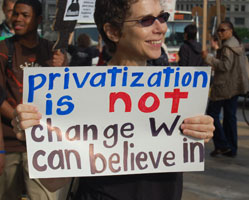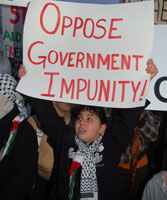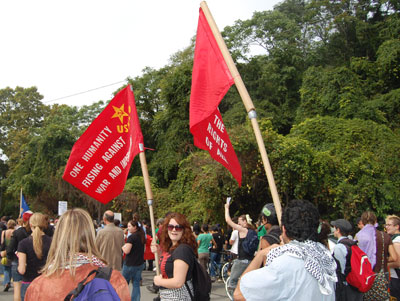Celebrate International Women’s Day
•
Affirm the Dignity of Women by Affirming the Rights of All • Obama Healthcare Plan: A Step Backward for Women's Health Care
• Haiti: Women Honor Leaders Who Died in the Earthquake
• History of International Women's Day
• New York City Event Welcomes Federation of Cuban Women
Celebrate International Women’s Day
Affirm the Dignity of Women
by Affirming the Rights of All
This year marks the 100th Anniversary of the decision to establish International Women’s Day as a Day to affirm the political, social and economic rights of women and their firm stand against imperialist war. The U.S. Marxist-Leninist Organization (USMLO) extends a red salute to all the women across the country and worldwide standing up for the rights of all. The dignity of women lies in affirming the rights of all and women everywhere are showing their recognition of this by being front and center in the many struggles for rights.
Women across the country are main organizers in battles across the country, such as the March actions to defend education, against war and for immigrant rights. As women and as workers, they are confronting the brutal anti-social offensive of the rich — against the rights to education, healthcare, housing, jobs, all social programs. And they are doing so by strengthening resistance. This can be seen in the union struggles with women at the fore, as well as those of immigrants, where women are rising to defend their families and communities, refusing to submit to collective punishment. It is women who can be seen in every struggle, every day, rejecting the violence of the poverty imposed on millions, the violence of police brutality and ICE raids, the violence of mass incarceration of youth and the school-to-prison and school-to-military pipeline.
Their demands are those of all society and their actions show that they do not accept the worsening conditions of inequality, exploitation and more poverty. They are demanding that government meet its social responsibility to fund all human needs as human rights and to stop funding war and repression. And as the ongoing organizing on many fronts and in many ways shows, women will not rest until their aim of a world fit for human beings is achieved. It is this spirit and stand that is celebrated here and worldwide on International Women’s Day.
USMLO applauds all the many actions, meetings, film festivals, and more taking place across the country to salute the achievements of women in defending rights. We encourage all our supporters and readers of Voice of Revolution (VOR) to join in celebrating International Women’s Day and to embrace its spirit by joining organizing work to defend the rights of all. Participate in work to build unity in action, such as the March anti-war demonstrations and immigrant rights demonstrations. Join all those rejecting yet another “reform” that denies the right to healthcare and funds the insurance monopolies. Lend a hand to May Day mobilizations. Help strengthen VOR's reporting and distribution among all those fighting for rights. Join in work to mobilize young women for revolutionary change.
Political empowerment is on the agenda for society and women have been in the forefront of this fight as well. It was women like Cindy Sheehan, Cynthia McKinney and Rosa Clemente that came forward to run in 2008 on an anti-war platform. With President Barack Obama and a Democrat majority in Congress in office for one year now, it has become even more clear that electing representatives of the rich provides no solutions. We need our own candidates, representing our demands and fighting spirit. Let women again come forward in 2010 and 2012. Let us build slates of anti-war candidates standing up for an anti-war government. Now is the time!

![]()


![]()


![]()

![]()

![]()


![]()


[TOP]
A Step Backward for Women's Health Care
 On March 8, after a rousing speech in Philadelphia pushing for health reform passage, President Obama will celebrate International Women's Day with a White House reception honoring women around the world for their achievements.
On March 8, after a rousing speech in Philadelphia pushing for health reform passage, President Obama will celebrate International Women's Day with a White House reception honoring women around the world for their achievements.
This recognition is important. However, International Women's Day — the brainchild of a group of predominantly socialist women with revolutionary dreams of equality and basic human rights for all — presents an opportunity for a little more expansive thinking on the part of the Obama administration.
One item that is ripe for rethinking, ASAP: the gender discrimination that is burning a hole through the Senate health reform bill that is headed for a House vote next week.
Though the Senate bill lacks the Stupak stamp of shame, it certainly does not come up short in the department of reactionary anti-choice provisions. Currently, the vast majority of private health plans cover abortion procedures. The Senate plan endorsed by President Obama would severely complicate payments for abortion-inclusive plans, requiring individuals covered by those plans to write two separate checks — one to cover abortion procedures and one for all other coverage. Insurers then must deposit abortion payments and everything-else payments into two separate accounts.
Chances are, the new regulations would drive insurance companies to drop abortion coverage from their plans, according to health policy analysts. These eliminations would impact millions of Americans: more than one-third of adult women in the U.S. have had at least one abortion. When it comes to choice, the health reform plan in its current state marks a dangerous step backward.
The bill's shortcomings for women do not stop at abortion. Earlier in the health-care-push season, Obama promised a plan that would eliminate "gender rating" — the practice of charging more for women's coverage than for men's. Gender rating is still going strong in 40 states. Insurance companies rally around the excuse that the policy is "actuarially based"; that women cost more to insure than men, mostly due to pregnancy and birth-related medical care. Beneath that flimsy statistical veil, it is blatant discrimination: Insurance companies acknowledged that themselves 40 years ago when they abandoned race as a price-determining factor.
Despite the president's promise, the Senate bill upon which we are pinning our hopes for health reform would not eradicate gender rating. It would openly permit the practice for employers of businesses with 100 employees or more, giving large employers an obvious incentive to hire men over women to keep down insurance costs. Gender rating also puts businesses with a mostly female workforce — childcare centers, some school districts and nurse associations — at a disadvantage. According to the National Women's Law Center, "One such employer with a predominantly female workforce estimated that, due to gender rating, her annual premiums were $2,000 higher per employee."
As the health care debate drags on and on, there is a lot of shushing going around. Many leading Democrats are hoping to sweep the Senate bill's discriminatory flaws under the rug. After all, health reform is desperately needed, and it would be really nice to finally push a passable bill through before we all lose our sanity (not to mention our insurance).
However, as it stands, the health reform bill would endanger the basic human rights of many women. This International Women's Day, it is time for Congress and the president to stop ignoring the bill's consequences for women's health coverage — and start discussing options for averting them.
Planned Parenthood President Cecile Richards calls for Congress to fix the legislation's abortion caveats during reconciliation — a move that could prove very difficult, since reconciliation is designed to address only items that are relevant to the budget. Jodi Jacobson at RH Reality Check notes that the only route to a true repair job may be a "future bill aimed at making technical fixes to health reform."
Either way, the work to protect women's health coverage from these sweeping restrictions and limitations must begin now. As the International Women's Day reception festivities wind down at the White House tonight, the president should do some hard thinking about how to ensure the basic human right of health care for women here at home.
[TOP]
Women Honor Leaders
Who Died in the Earthquake
Shortly after the devastating earthquake in Haiti, Latin American and Caribbean women activists established the International Feminist Solidarity Camp Myriam Merlet, Anne Marie Coriolan, and Magalie Marcelin in the Dominican Republic. The camp was named after three women rights activists who died in the earthquake. The camp was set up as a physical and digital hub to provide ongoing assistance to Haitian women's organizations in the work of rebuilding their country, to ensure alternative media coverage of the situation in Haiti and to monitor the work of international aid agencies to ensure they pay attention to the specific needs of women and young girls.
On February 17 the International Feminist Solidarity Camp called on women around the world to include activities honoring the Haitian women activists as part of their International Women's Day activities. This initiative emerged from a women's meeting on January 24 in Port au Prince, and was then adopted at a meeting of the International Feminist Solidarity Camp Myriam Merlet, Magalie Marcelin and Anne Marie Coriolan, held in the Dominican Republic from January 26-27.
In their call they say "We are calling organizations throughout the world to join us that day to honor and mourn our loss of feminist activists which will allow us to revive and recreate momentum of the Haitian women's movement to continue the important work of our fallen leaders and the legacy they have left for those of us who continue the work"
"The main activity will take place that day in Plaza Catherine Flon in Champ de Mars in the center of Port au Prince, a park that symbolizes Haitian women's participation to the war towards independence two centuries ago," they say.
"It is being organized by the Haitian women's organizations locally to acknowledge and honor the human suffering of the catastrophe in Haiti, promote feminist values based on the human rights of all, the struggle for well being of all in Haiti and urban planning, reaffirm feminist struggles despite the loss of significant feminist leaders, strengthen solidarity and display a MEMORIA which will take the form of testimonies, a mural and a slide show."
In the communiqué announcing the event they explain the significance of the location for the main commemoration. "Catherine Flon is widely regarded by Haitians as one of the heroes of the struggle to put an end to slavery, as she sewed the first Haitian flag on May 18, 1803 on the last day of the colonial congress session where leaders of the revolution at that session solemnly swore an oath to liberty or death on the flag which then led the slaves to victory and freedom. This oath is known historically as the Oath of the Ancestors."
On the activities of the three feminist leaders being memorialized, the communiqué says:
"All three leaders had a long standing trajectory in feminist activism reforming a judiciary that never took rape seriously, creating organizations and houses to protect girls and women against domestic violence and trafficking, publishing a feminist newspaper, expanding a documentary center and an historical archive, and struggling for the protection of sexual and reproductive rights.
"Merlet was a feminist activist, and an advisor and former chief-of-staff for the Haitian Minister of Women. As an outspoken activist, Merlet helped draw international attention to the use of rape as a political weapon, and other issues related to violence against women and girls. She was one of the founders of Enfofanm, the first feminist information and documentation center that also promotes women's rights.
"Magalie Marcelin was a lawyer, activist and actress, who two years ago urged women to pack a courtroom in Haiti, where she succeeded in getting a guilty verdict against a man who battered his wife. Marcelin was a founder of Kay Fanm, a women's rights organization that deals with domestic violence, offers services and shelter to women and provides microcredit, or small loans, to women working in markets.
"Anne Marie Coriolan served as a top advisor to the women's ministry. Assisted by their efforts, the ministry developed key initiatives to raise awareness of violence against women and created programs to help women gain financial independence. Coriolan was also the founder of Solidarité Fanm Ayisyen (Solidarity with Haitian Women, or SOFA), an advocacy and services organization."
Local activities in other countries for March 8 have already been announced by women's organizations in Chile, Argentina, Honduras, Puerto Rico, Brazil, Canada, and elsewhere. A special roundtable is being organized to honor these three feminist leaders, among others killed in the quake at the United Nations Headquarters in New York during the Commission on the Status of Women session.
[TOP]
History of International Women's Day

![]()

Historic site in Copenhagen, Denmark where women from around the world gathered for the
Second International Conference of Socialist Women in 1910 and passed the resolution establishing International Women's Day.
This year marks the centenary of the resolution passed by the Second International Conference of Socialist Women held in Copenhagen, Denmark in 1910 establishing International Women's Day. The resolution was unanimously adopted by the more than 100 women delegates from 17 countries attending, among whom were the first three women elected to the Finnish parliament. The resolution was put forward by German communist Clara Zetkin who had first proposed the idea of an annual demonstration in support of working women and women's rights at the First International Conference of Socialist Women held in Stuttgart, Germany in 1907.
This Second International Conference reiterated the principles adopted at the First International Conference of Socialist Women on the question of women's suffrage. These principles established the framework for the resolution to establish an International Women's Day that focused on the question of women's political rights.
The document states in part:
"The socialist woman's movement of all countries repudiates the limited Woman's Suffrage as a falsification of and insult to the principle of the political equality of the female sex. It fights for the only living concrete expression of this principle: the universal woman's suffrage which is open to all adults and bound by no conditions of property, payment of taxes, or degrees of education or any other qualifications, which exclude members of the working class from the enjoyment of the right. They carry on their struggle not in alliance with the bourgeois Women's Righters, but in alliance with the Socialist Parties, and these fight for Woman's Suffrage as one of the demands which from the point of view of principle and practice is most important for the democratization of the suffrage."
Stating that the socialist parties in all countries are "bound to fight with energy for the introduction of Woman's Suffrage" it says that the socialist women's movement must take part in the struggles organized by the socialist parties for the democratization of the suffrage, while at the same time ensuring that within this fight the "question of the Universal Woman Suffrage is insisted upon with due regard to its importance of principle and practice."
The resolution to establish International Women's Day states,
"In order to forward political enfranchisement of women it is the duty of the Socialist women of all countries to agitate according to the above-named principles indefatigably among the laboring masses; enlighten them by discourses and literature about the social necessity and importance of the political emancipation of the female sex and use therefore every opportunity of doing so. For that propaganda they have to make the most especially of elections to all sorts of political and public bodies."
The delegates resolved,
"In agreement with the class-conscious political and trade organizations of the proletariat in their country the socialist women of all nationalities have to organize a special Woman's Day, which in first line has to promote Women Suffrage propaganda. This demand must be discussed in connection with the whole women's question according to the socialist conception of social things."
A "Woman's Day" had been organized the previous year in the United States, on the last Sunday in February 1909, by the National Women's Committee of the American Socialist Party marked by demonstrations for women's rights. Women's suffrage along with the rights of women workers, particularly in the garment trade, were the focus of these demonstrations. This Woman's Day honored the thousands of women involved in the numerous labor strikes in the first years of the twentieth century in many cities, including Montreal, Chicago, Philadelphia and New York. This was a period when women entered the labor force in their thousands and alongside working men fought to organize collectively and to improve their brutal conditions of work.
Later in 1909, needle-trade workers in New York City — 80 percent of whom were women — walked off their jobs and marched and rallied for union rights, decent wages and working conditions in the "Uprising of 20,000." The work stoppage was reportedly referred to as the "women's movement strike" and continued from November 22, 1909 to February 15, 1910. The Women's Trade Union League provided bail money for arrested strikers and large sums for strike funds during the work stoppage.
Early Celebrations of International Women's Day
March 19, 1911 was the date set for the first International Women's Day by the Second International Conference of Socialist Women and, implementing their resolution, rallies held in Austria, Denmark, Germany and Switzerland on that day were attended by more than one million women and men. "The vote for women will unite our strength in the struggle for socialism" was the call of these rallies. In addition to their demand for the right to elect and be elected, they demanded the right to work, to vocational training and to an end to discrimination on the job. A woman socialist wrote at that time:
"The first International Women's Day took place in 1911. Its success exceeded all expectation. Germany and Austria on Working Women's Day was one seething, trembling sea of women. Meetings were organized everywhere -- in the small towns and even in the villages halls were packed so full that they had to ask male workers to give up their places for the women.
"This was certainly the first show of militancy by the working woman. Men stayed at home with their children for a change, and their wives, the captive housewives, went to meetings. During the largest street demonstrations, in which 30,000 were taking part, the police decided to remove the demonstrators' banners: the women workers made a stand. In the scuffle that followed, bloodshed was averted only with the help of the socialist deputies in Parliament."
The following year, women in France, the Netherlands and Sweden joined in actions marking International Women's Day. In the period leading up to the declaration of World War I, the celebration of International Women's Day opposed imperialist war and expressed solidarity between working women of different lands in opposition to the national chauvinist hysteria of the ruling circles. For example, in Europe International Women's Day was an occasion when speakers from one country would be sent to another to deliver greetings.
Russian women observed their first International Women's Day on the last Sunday in February 1913 (on the Julian calendar, which corresponded to March 8 on the Gregorian calendar in use elsewhere), under conditions of brutal Tsarist reaction. There was no possibility of women organizing open demonstrations but, led by communist women, they found ways to celebrate the day. Articles on International Women's Day were published in the two legal workers' newspapers of the time, including greetings from Clara Zetkin and others.
An essay written in 1920 by a woman communist activist at that time described the 1913 celebration:
"In those bleak years meetings were forbidden. But in Petrograd, at the Kalashaikovsky Exchange, those women workers who belonged to the Party organized a public forum on 'The Woman Question.' Entrance was five kopecks. This was an illegal meeting but the hall was absolutely packed. Members of the Party spoke. But this animated 'closed' meeting had hardly finished when the police, alarmed at such proceedings, intervened and arrested many of the speakers.
"It was of great significance for the workers of the world that the women of Russia, who lived under Tsarist repression, should join in and somehow manage to acknowledge with actions International Women's Day. This was a welcome sign that Russia was waking up and the Tsarist prisons and gallows were powerless to kill the workers' spirit of struggle and protest."
Women in Russia continued to celebrate International Women's Day in various ways over the ensuing years. Many involved in organizing landed themselves in Tsarist prisons as the slogan "for the working women's vote" had become an open call for the overthrow of the Tsarist autocracy.
The first issue of "The Woman Worker" (Rabotnitsa), a journal for working class women, was published in 1914. That same year, the Bolshevik Central Committee decided to create a special committee to organize meetings for International Women's Day. These meetings were held in the factories and public places to discuss issues related to women's oppression and to elect representatives from those who had participated in these discussions and the resulting proposals to work on the new committee.
International Women's Day 1917 in Russia
 In Russia, International Women's Day 1917 was a time of intense struggle against the Tsarist regime. Workers, including women workers in textile and metal working industries, were on strike in the capital city and opposition to Russia's participation in the imperialist war raging in Europe was growing. On March 8 (February 23 on the Julian calendar), women in their thousands poured onto the streets of St. Petersburg in a strike for bread and peace. The women factory workers, joined by wives of soldiers and other women, demanded, "Bread for our children" and "The return of our husbands from the trenches." This day marked the beginning of the February Revolution, which led to the abdication of the Tsar and the establishment of a provisional government.
In Russia, International Women's Day 1917 was a time of intense struggle against the Tsarist regime. Workers, including women workers in textile and metal working industries, were on strike in the capital city and opposition to Russia's participation in the imperialist war raging in Europe was growing. On March 8 (February 23 on the Julian calendar), women in their thousands poured onto the streets of St. Petersburg in a strike for bread and peace. The women factory workers, joined by wives of soldiers and other women, demanded, "Bread for our children" and "The return of our husbands from the trenches." This day marked the beginning of the February Revolution, which led to the abdication of the Tsar and the establishment of a provisional government.
The provisional government made the franchise universal, and recognized equal rights for women. Following the October 1917 Revolution, the Bolshevik government implemented more advanced legislation, guaranteeing in the workplaces the right of women to directly participate in social and political activity, eliminating all formal and concrete obstacles which previously had meant the subordination of their social and political activity and their subservience to men. New legislation on maternity and health insurance was proposed and approved in December 1917. A public insurance fund was created, with no deductions from workers wages that benefited both women workers and male workers' wives. It meant that women were now treated second to none, as neither they nor their children were dependent on spouses and fathers for their well-being.
Celebrations After 1917
March 8 as International Women's Day became official in 1921 when Bulgarian women attending the International Women's Secretariat of the Communist International proposed a motion that it be uniformly celebrated around the world on this day. March 8 was chosen to honor the role played by the Russian women in the revolution in their country, and through their actions, in the struggle of women for their emancipation internationally.
The first IWD rally in Australia was held in 1928. It was organized by the communist women there and demanded an eight-hour day, equal pay for equal work, paid annual leave and a living wage for the unemployed.
Spanish women demonstrated against the fascist forces of Gen. Francisco Franco to mark International Women's Day in 1937. Italian women marked IWD 1943 with militant protests against fascist dictator Benito Mussolini for sending their sons to die in World War II.
In this way, since 1917, International Women's Day has been both a day of celebration of women's fight for their rights and the rights of all and a day to militantly affirm the opposition of women to imperialist war and aggression. Its spirit has always been that to win the rights of women and the fight for security and peace, women must put themselves in the front ranks of the fight and of governments that represent these demands.
[TOP]
New York City Event Welcomes Federation of Cuban Women

[TOP]
